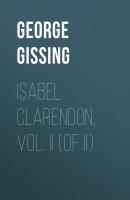Isabel Clarendon, Vol. II (of II). George Gissing
Чтение книги онлайн.

Читать онлайн книгу Isabel Clarendon, Vol. II (of II) - George Gissing страница 8
Название: Isabel Clarendon, Vol. II (of II)
Автор: George Gissing
Издательство: Public Domain
Жанр: Зарубежная классика
isbn:
isbn:
She was alone in Mrs. Stratton’s boudoir next morning, when the door was pushed open; turning, she saw her cousin.
“I was told that I might come here in search of you,” said Robert, with his genial smile. “How do you do?”
“Very well, thank you. How are you?—as the children answer. But I needn’t ask that; you have a wonderful faculty for looking healthy.”
“I don’t think there’s often much amiss with me. Setting aside the chance of breaking my neck over a fence, I think I may promise myself a few more years.”
“And the risk of fences you are wise enough to avoid.”
“Nothing of the kind. I was hunting in Leicestershire only yesterday.”
“Impossible, Robert!”
“Indisputable fact–” He had it on his lips to call her “Isabel,” but for some reason checked himself. “A friend of mine took me down and mounted me. I enjoyed it thoroughly.”
“But you are becoming an Englishman.”
“Was I ever anything else?”
“I believe I generally think of you in an Oriental light. At all events, you smoke a hookah, and very much prefer lying on a rug to sitting on a chair.”
“The hookah I have abandoned; the rug comes of your imagination.”
“Oh dear no; it was one of the first things you said to me when you came to see me last spring in town. It stamped you in my mind for ever.”
They laughed.
“But I want to know how you are?” Robert resumed, leaning to her, with his hands on his knees. “Mrs. Stratton’s account is too vaguely ladylike. How, in truth, are you?”
A ripple of laughter replied to him.
“You show me that you can be mirthful; that is much, no doubt. But you must have a change.”
“Am I not having one?”
“Oh, I don’t call this a change. You must get fresh air.”
Asquith’s way of speaking with her was not quite what it had formerly been. He assumed more of—was it cousinship?—than he had done, Possibly the man himself had undergone certain changes during the last few months. Oriental he had been to a certain extent; something of over-leisureliness had marked his bearing; there had been an aloofness in his way of remarking upon things and people, a kind of mild fatalism in his modes of speech. An English autumn with its moor-sport and the life of country houses; an English winter with growth of acquaintances at hospitable firesides had doubtless not been without their modifying influence; but other reasons were also discoverable for the change in his manner towards Isabel. For one thing, he had heard of her refusal of Lord Winterset; for another, he knew of Ada’s approaching marriage.
She made no reply to his advice, and he continued.
“You know Henry Calder?”
“Well.”
“You know that he has been absolutely ruined by a bank failure?”
“You don’t say so?”
“Indeed. The poor fellow is in a wretched state—utterly broken down; they feared a few weeks ago that he was going crazy. You know that he was great at yachting; of course he has had to sell his yacht, and I have bought it.”
“What will you tell me next?”
“Why, this. It is essential that poor Calder should get away to the South, and nothing would do him half as much good as a sail among the islands. Now I propose to ask him to accompany me on such a cruise, say at the beginning of next month. He and I have been on the best of terms since we were lads, and there’s no kind of awkwardness in the arrangement; he goes to put me up to the art of seamanship. Of course his wife accompanies him, and probably their eldest girl.”
“That’s the kindest thing I have heard for a long time, Robert,” said Isabel, giving him a look of admiration.
“Oh dear no; nothing could be simpler. And now—I want you to come with them.” Isabel shook her head.
“But what is your objection?”
“I cannot leave England at present.”
“I don’t ask you to. We are at the middle of January; it will be time enough in three weeks.”
“Out of the question.”
She still shook her head, smiling. Robert reflected for a moment.
“When does this marriage take place?” he asked abruptly.
“Very shortly, I suppose. I have written to Mr. Lacour to request him to make arrangements as soon as he likes. I shall meet him in London on Monday.”
“Good. Then you are absolutely free.”
“I am not free.”
He glanced at her inquiringly.
“I am not free,” Isabel repeated, looking straight before her.
“I suppose I shall be grossly impertinent if I ask what it is that holds you?”
“I cannot now tell you, Robert, but—I must remain in England.”
Her voice had a tremor in it, which she did her best to subdue. She was smiling still, but in a forced, self-conscious way.
Asquith leaned back; he had lost his look of cheerful confidence.
“But it isn’t such a grave matter, after all,” said Isabel, restoring the former tone. “It was a very kind thought of yours, very kind—but you won’t quarrel with me because I can’t come? It will make no difference in your plan for the Calders, surely?”
“I can’t say, I’m sure,” Asquith replied, in an almost petulant manner, strangely at variance with his ordinary tone. He had thrust his hands СКАЧАТЬ